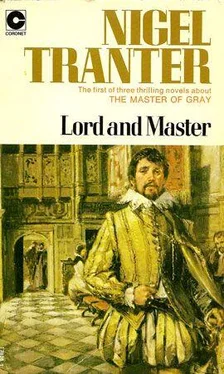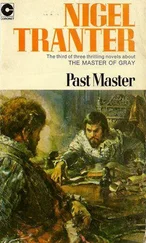Nigel Tranter - Lord and Master
Здесь есть возможность читать онлайн «Nigel Tranter - Lord and Master» весь текст электронной книги совершенно бесплатно (целиком полную версию без сокращений). В некоторых случаях можно слушать аудио, скачать через торрент в формате fb2 и присутствует краткое содержание. Жанр: Исторические приключения, на английском языке. Описание произведения, (предисловие) а так же отзывы посетителей доступны на портале библиотеки ЛибКат.
- Название:Lord and Master
- Автор:
- Жанр:
- Год:неизвестен
- ISBN:нет данных
- Рейтинг книги:4 / 5. Голосов: 1
-
Избранное:Добавить в избранное
- Отзывы:
-
Ваша оценка:
- 80
- 1
- 2
- 3
- 4
- 5
Lord and Master: краткое содержание, описание и аннотация
Предлагаем к чтению аннотацию, описание, краткое содержание или предисловие (зависит от того, что написал сам автор книги «Lord and Master»). Если вы не нашли необходимую информацию о книге — напишите в комментариях, мы постараемся отыскать её.
Lord and Master — читать онлайн бесплатно полную книгу (весь текст) целиком
Ниже представлен текст книги, разбитый по страницам. Система сохранения места последней прочитанной страницы, позволяет с удобством читать онлайн бесплатно книгу «Lord and Master», без необходимости каждый раз заново искать на чём Вы остановились. Поставьте закладку, и сможете в любой момент перейти на страницу, на которой закончили чтение.
Интервал:
Закладка:
Elizabeth's letter amazed even Patrick Gray. In terms of heartfelt sorrow and sympathy, it mourned Mary's death as a miserable accident that had befallen, far contrary to her own royal meaning. It was all the fault of her Secretary Davison, she declared, who had wickedly outstepped his responsibilities and given orders in her name, for which grave fault he was now confined to the Tower of London, dismissed his office, and his property confiscated. For herself, she was prostrated by this unfortunate incident, was overwhelmed with excessive grief, indeed had been made very ill and had eaten nothing for days. James would understand full well the problems of amonarch with untrustworthy underlings, of which she judged he had had rich experience. Suitable and tangible expressions of regret and recompense naturally would be forthcoming, but meanwhile would James accept the deep and sincere condolences of his devoted sister in God, Elizabeth R.
King James's first reactions, that this was a very suitable and proper-letter, were rudely upset by the much less understanding and charitable reactions of his councillors and nobles. Bothwell, Angus, Mar and the rest of the Ruthven lords seemed to have lost all their previous fondness for Elizabeth. The Catholic leaders, of course, made a great outcry. On Patrick's advice, a strictly limited foray of Kerrs was dispatched over the Border, in a flag-showing gesture which was straitly enjoined to avoid large centres of population and not to burn any important castles. A suitable letter of protest was also concocted, for transmission to Elizabeth – sufficient to show the deep hurt sustained, without of course disturbing international relations – and prayers ordered for the soul of the-departed in Scottish churches, however contrary to Calvinist principles. More than this seemed scarcely feasible in the circumstances.
As the news leaked out, however, and spread abroad through the land, the Scottish people, lacking any understanding of statecraft or the predicaments of rulers and princes, blazed out into elemental and extraorclinary fury. Without more than a rumble or two of warning, almost the entire country seemed to erupt in wrath. Highlands and Lowlands both gave tongue. Mobs formed in the cities and towns, demanding vengeance. The lesser lords, barons and lairds, insisted on the calling together of the Estates in Parliament. The Kirk was almost split in twain. Scotland, as distinct from the Scots nobility, seethed up as it had not done for centuries.
If the King and his immediate advisers were surprised, so, to some extent, were the great lords and the Council. It did not take these latter long, however, to grasp their cue. Soon they were heading up the popular clamour, arming men, demanding action. Every pass and road into England was closed by armed and angry companies. Six quite spontaneous and independent raids were made over the Border, causing the Kerrs' careful foray to seem like a puppet-show. Young Bothwell did indeed descend upon Carlisle, with nearly three thousand men, and while he did not manage to burn it, he created considerable havoc and alarm. Other raids by Home, Angus, Hamilton and others, penetrated much deeper into Cumberland and Northumberland, spreading terror and death, one particularly audacious joint effort by Scott of Buccleuch and Kerr of Cessford going the length of assaulting the English Warden, Sir Cuthbert Collingwood, in his own fortress of Eslington, burning him out, putting his men to the sword, and taking himself and his sons prisoner. Well might the English commander in the north write a piteous letter to Walsingham, describing the country as having been reduced to a desert, wasted with fire and sword and filled with lamentation and dismay.
All this, though stirring, did not satisfy Scotland – more especially as England, with highly unusual patience, refused to be drawn, and refrained from making any counter-moves worthy of the name. The King and his advisers were abused as feint-hearts, cravens and worse, and demands for outright war resounded The name of the Master of Gray, in especial, came to be spat upon, as the King's closest adviser.
That man of peace, however, continued to smile confidently, imperturbably, even when he was hooted at in the streets of Edinburgh. He had never had any high opinion of the populace anyway, of course. The fact that his brother David sided rather with the popular clamour, seemed only to amuse him. His advice to the King remained the one stable and predictable element in a maelstrom of emotion, tumult and confusion.
Unfortunately or otherwise, all this was the ideal forcing-ground for that most fatal of all Scots weaknesses – the preference for fighting each other instead of a common foe, that has been the comfort and stay of the English from time immemorial. Gradually, as Patrick had foreseen that it would, the clamour for invasion, reprisals, war, faded – or was at least metamorphosed into internal dissention. The strong urge to violence, since James refused to go to war – recognising the end of all his hopes of the English succession if he did – found outlet in turning upon the King himself, on his ministers and Council, on the symbols and servants of authority. Near-anarchy gripped the land – not for the first time in such circumstances, nor the last. Terrified, James cowered in Holyroodhouse, afraid to show himself to an angry people, who named him matricide, coward, Elizabeth's toy and hireling. Patrick, who had been trying, since he attained authority, to build up a national army, so that the Crown should not have to rely upon the unpredictable levies of arrogant lords, had only sufficient men as yet to protect the royal person and palaces. The country at large he could not attempt to control
The Catholic lords saw their opportunity, and sent out a call to arms, Huntly, Erroll and Herries sending an urgent demand to Philip of Spain for soldiers and support
Three short months after the execution of Mary Queen of Scots, her mourning realm was on the verge of civil war.
It was in these circumstances that England decided that the time was ripe for playing a somewhat more positive role – but not blatantly or too obviously. Walsingham wrote a lengthy and interesting letter – not to the Master of Gray, but to Sir John Maitland, the Secretary of State. It was a very important letter indeed, nevertheless, for Patrick Gray.
Conditions made Patrick almost something of a prisoner in Holyroodhouse, along with his royal master, when in the capital, since his beautiful but unpopular features were only too readily recognisable wherever he went. He and Marie had therefore taken residence meantime in the palace itself, now considerably overcrowded.
Nothing of these complications, of course, applied to David, whose aspect and apparel were ordinary enough to escape notice anywhere. He continued to live with Mariota and the children in their lofty eerie in the Lawnmarket, and in consequence heard much of what went on in the city of which his brother remained ignorant.
David came to Patrick's quarters in the palace rather urgently one night in early May – an unusual procedure. Marie, who greeted him, remarked on it
'How good to see you, Davy,' she declared warmly, taking his hand. 'You are as good as a stranger to me, this while back, I do declare. I believe that you avoid me, do you not? Confess it Sorrow that it should be so – whatever the cause.'
He shook his head. 'Not so,' he declared. 'No, no. You I would never avoid, Marie.' But he looked away from her, out towards the dim bulk of Arthur's Seat, rising huge in the gloom.
'It is Patrick again, is it not? You are at odds with Patrick, Davy? Seriously at odds. Oh, I always know it, when you are. Patrick shows it plainly enough…'
'Patrick!' his brother jerked. 'As though Patrick could care for any opinions of mine!'
Читать дальшеИнтервал:
Закладка:
Похожие книги на «Lord and Master»
Представляем Вашему вниманию похожие книги на «Lord and Master» списком для выбора. Мы отобрали схожую по названию и смыслу литературу в надежде предоставить читателям больше вариантов отыскать новые, интересные, ещё непрочитанные произведения.
Обсуждение, отзывы о книге «Lord and Master» и просто собственные мнения читателей. Оставьте ваши комментарии, напишите, что Вы думаете о произведении, его смысле или главных героях. Укажите что конкретно понравилось, а что нет, и почему Вы так считаете.












